What to watch for in the Democratic 2016 race this fall
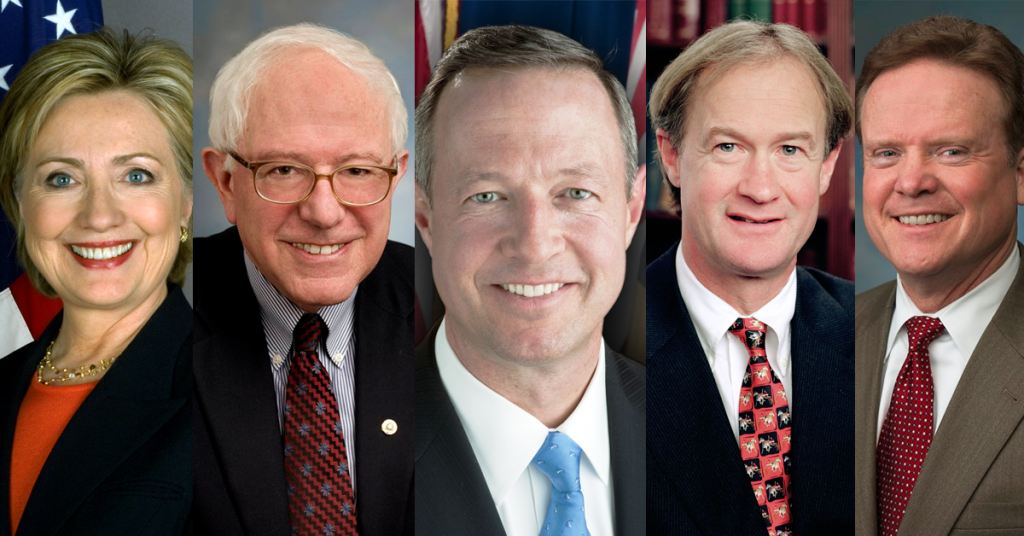
The dog days of summer are over for the Democratic presidential candidates. In just five months, voters will begin to get their say in the 2016 race. And on this Labor Day weekend, the White House hopefuls are descending on Iowa for town hall-style meetings, union picnics and chicken cookouts. The burst of activity marks the start of a more intense phase in the primary. How the candidates position themselves in the coming weeks could have a big impact on their standing in February when primary voters make their choice in key early-voting states. Some things to watch from Democrats this fall. __ DOES BIDEN HAVE BITE? Vice President Joe Biden has spent much time over the past few weeks with advisers and family, weighing whether to get into the race. Normally, a vice president would be considered the heavy favorite. But a fall start for Biden would complicate efforts to build the type of robust organization needed to compete with Hillary Rodham Clinton, the front-runner. Her team has kept fairly quiet about Biden, but there’s little question his late entry would shake up the contest. Biden should expect intense scrutiny until he announces his decision. This past week, he said about his readiness for a campaign: “The honest-to-God answer is I just don’t know.” __ HEARING HILLARY At least five government entities are investigating Clinton’s actions as secretary of state. The public centerpiece of all these investigations is likely to be her testimony, scheduled for Oct. 22, before the House committee investigating the deadly attacks in Benghazi, Libya, in 2012 that killed four Americans. Republicans see the hearing as an opportunity to find out what, if anything, she’s been hiding. Clinton aides see a chance to put an email controversy behind. They argue that the hearing gives her a platform to shame Republican critics for what her backers perceive as little more than political witch hunt. Republicans are aware of the danger of overreaching and say their questions will focus on the Libyan attacks. How Clinton engages some of her critics will set the tone not only for the primary contest but, should she win her party’s nomination, the general election. __ YOU’VE (STILL) GOT MAIL, MRS. CLINTON This past week marked the six-month anniversary of the Clinton email firestorm, sparked by revelations that she conducted government business over a private server in her New York home when she was secretary of state. Her campaign has struggled to manage the outcry, first ignoring it, then pushing back aggressively. Neither strategy has quelled the furor. Aides say Clinton plans to give more interviews and answer more questions about the matter in hopes of putting the issue to rest. She got started Friday, when Clinton told NBC News that when taking office as secretary of state, “I didn’t really stop and think what kind of email system will there be?” A court-ordered monthly release of her State Department correspondence all but guarantees the matter will follow her right into the early primary contests. The last agency email release is set for Jan. 29 — three days before Iowa caucuses. __ DOES AUTUMN COOL THE SANDERS SURGE? Vermont Sen. Bernie Sanders has watch as his crowds swelled and polling numbers spiked along with the thermometer over the past several months. Now, he’s trying to build an organization to match his momentum. His campaign is on a hiring spree, trying to find paid staff and volunteers to lead the kind of mass outreach to voters in early primary states that Sanders backers like to call “Bern-Storming.” Clinton aides acknowledge that Sanders has made headway, saying they expect a tight primary — particularly in New Hampshire. His ability to form a team that can take on Clinton’s Brooklyn-based behemoth will be instrumental in what happens next winter. __ DEBATE DRAMA With their first Democratic primary debate just six weeks away, the candidates have already started strategizing for the big night. Former Maryland Gov. Martin O’Malley, whose support is in the single digits, has mounted a vocal push for the party to expand the number of debates, even encouraging protests in front of Democratic Party headquarters. By investing so much energy in the importance of the debates, O’Malley has only heightened the pressure to make a splash in the first one, on Oct. 13. Republished with permission of The Associated Press.
Presidential TV ad roundup: August 28 edition

Here’s a roundup of all the Presidential TV ads from this past week: Jeb Bush Title: Fighting for Conservative Education Reform Published: August 20, 2015 Tone: Confident Title: Catastropic Published: August 24, 2015 Tone: Cynical and doubtful Title: Hurricane response Published: August 25, 2015 Tone: Straightforward Title: Transparency vs Secrecy Published: August 27, 2015 Tone: Honest Title: For our veterans Published: August 28, 2015 Tone: Respectful and optimistic Ted Cruz Tone: Stand for religious liberty Published: August 25, 2015 Tone: Disappointed but hopeful Scott Walker Title: Talk vs. Action: On Planned Parenthood Published: August 16, 2015 Tone: Accomplished Martin O’Malley Title: Join Us to Rebuild the American Dream Published: August 25, 2015 Tone: Self-assured
Donald Trump dumps insults on questioners, insists on control
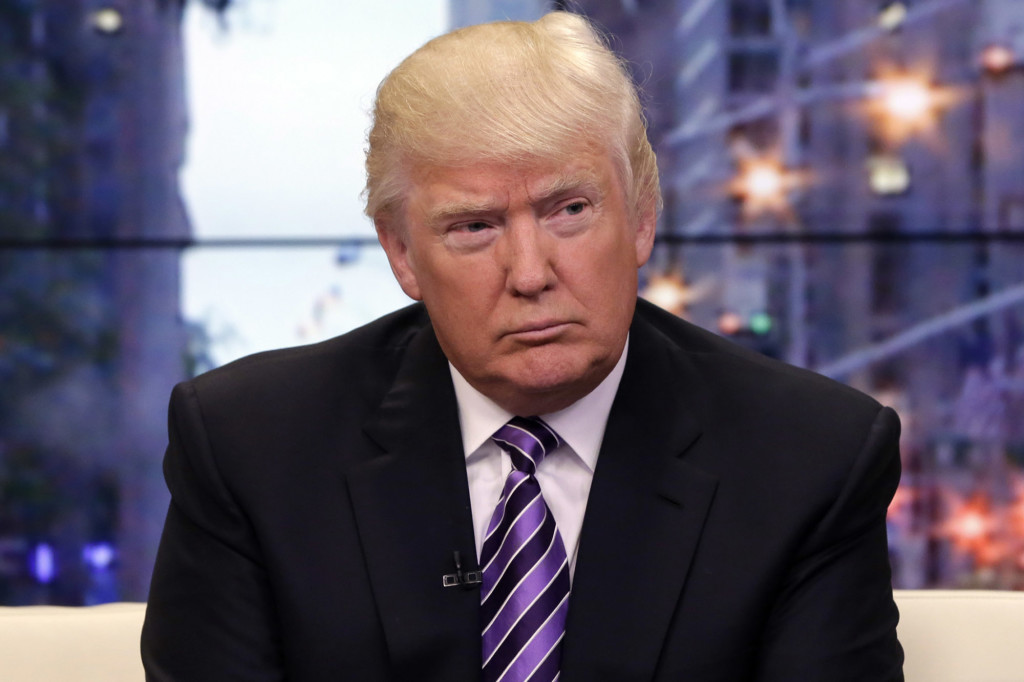
For Donald Trump, the joy of the insult seems as compelling as the art of the deal. Whether his challengers are fellow presidential candidates, the press or others, they are, according to Trump: incompetent, weak, pathetic, disgusting, idiots or the like. He described Democratic presidential contender Martin O’Malley, for example, as acting “like a disgusting, little, weak, pathetic baby.” So far in the rollicking 2016 presidential contest, the billionaire businessman is showing little willingness to dial down his because-I-said-so style to suit the conventions of political campaigns – where the voters are supposed to be the boss. Trump is used to controlling his world like the boss he is. On Tuesday night, he dismissed a Latino reporter from his press conference for demanding to know how Trump intended to deport all 11 million people in the country illegally. “I have a right to ask a question,” said Univision’s Jorge Ramos. “No you don’t,” Trump said. “You haven’t been called.” Trump merely tossed a glance to his left and a bodyguard escorted a protesting Ramos out. Trump’s primacy re-established, he later let Ramos back into the conference and took his question. Count on Trump to react when someone crosses him, even mildly. “When somebody hurts you, just go after them as viciously and as violently as you can,” Trump wrote in his book “How to Get Rich.” In fact, Trump’s reality show campaign is one of the things people like about him. Trump is at the top of the polls in the GOP field, drawing more passion and bigger crowds than his Republican competitors. “It’s totally refreshing,” said Leigh Ann Crouse, 55, of Dubuque, as she waited in a 100-yard-long line Tuesday to see Trump. “He has a backbone, and he cannot be bought.” Here are some examples of Trump’s in-your-face approach to the 2016 presidential contest: —- TRUMP vs JEB BUSH Trump succeeded this week in putting the former Florida governor, whose wife is Mexican-American, on the defense on immigration issues. The two quarreled over the term “anchor baby,” which some find an offensive term to describe children born to people in the U.S. illegally. Bush defended himself by saying he’d been referring to wealthy Asians who come to the U.S. to bear children. That earned Bush a chorus of demands for an apology to Asian people. “Asians are very offended that JEB said that anchor babies applies to them as a way to be more politically correct to Hispanics,” Trump gloated on Twitter. “A mess!” But a true Trumpism requires a personal dig. Trump has repeatedly served that up by calling Bush “low energy” and suggesting “every time you watch him, you fall asleep.” — TRUMP vs JORGE RAMOS: “Go back to Univision,” Trump told Ramos, an anchor for the Spanish-language network. It was the latest salvo in Trump’s conflict with Univision, which began when the network cancelled its contract to broadcast his Miss Universe Organization pageants. Univision said it was responding to Trump’s description of Mexican immigrants as criminals and “rapists” in his June campaign announcement speech. Trump is suing the network for $500 million for breach of contract and defamation – and bragging about it. Five times during the news conference, Trump told Ramos to sit down. When that didn’t work, the billionaire had Ramos hustled out. Letting him back in later, Trump extended an upturned hand toward Ramos and said, “Yes? Good, absolutely. Good to have you back.” Trump complained Wednesday on NBC’s “Today” show that Ramos had been “totally, absolutely out of line” and “ranting and raving like a madman.” “I’m not a bully,” Trump said. “In fact, I think it’s just the opposite way.” — TRUMP vs MEGYN KELLY: Trump’s feud with the popular Fox News anchor began during the first Republican primary debate, when Kelly called Trump out on his previous comments describing women as “pigs” and “dogs.” Convinced that the question was out of line, Trump launched a full-blown campaign to discredit the anchor with a series of insulting tweets and interviews. On CNN, he claimed that she’d had “blood coming out of her eyes, blood coming out of her wherever” during the debate. After what had seemed like a detente with the network, Trump’s vitriol returned this week when Kelly came back from vacation. “(at)megynkelly must have had a terrible vacation, she is really off her game,” he tweeted Monday. He retweeted another comment that referred to her as a “bimbo.” — TRUMP vs LINDSEY GRAHAM: Trump made clear he had zero regard for the rules of political decorum when he proceeded to read South Carolina Sen. Lindsey Graham’s personal cellphone number to a roomful of his supporters after Graham, one of his Republican rivals, called him a “jackass” on TV. The two have continued to spar, with each calling the other an “idiot.” “Come to South Carolina, and I’ll beat his brains out,” a riled-up Graham told CNN on Tuesday, referring to beating Trump in his state’s Republican primary. “I know my state. This is a silly season in politics. He is shallow.” Trump responded with a tweet: “Congrats (at)LindseyGrahamSC. You just got 4 points in your home state of SC-far better than zero nationally. You’re only 26 pts behind me.” — TRUMP vs. FOX NEWS: Fox News is the kind of beast that Republican wannabes rarely take on. Not Trump. “I think they cover me terribly,” he told reporters at the press conference in Iowa, in which he repeatedly railed against his coverage by the network, despite frequent appearances and phone-ins. Trump returned to bashing Kelly this week, and the network chief Roger Ailes engaged. “Megyn Kelly represents the very best of American journalism and all of us at Fox News Channel reject the crude and irresponsible attempts to suggest otherwise,” Ailes said in a statement demanding Trump apologize. “I could not be more proud of Megyn for her professionalism and class in the face of all of Mr. Trump’s verbal assaults,” he added. Trump, meanwhile, shows no
Hillary Clinton lawyer says her email server was wiped clean
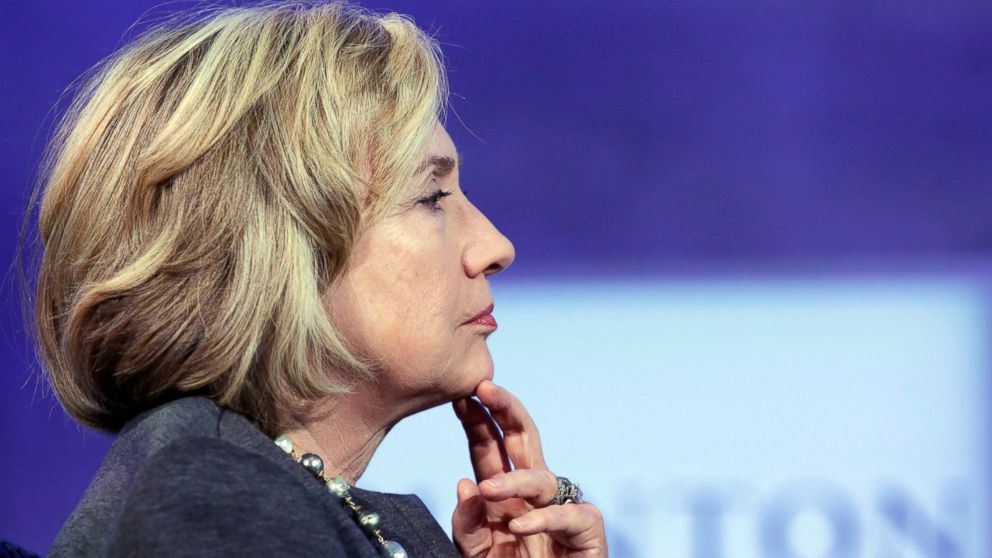
Hillary Rodham Clinton‘s personal lawyer has told a Senate committee that emails and all other data stored on her computer server were erased before the device was turned over to federal authorities. In a letter sent last week to Sen. Ron Johnson, R-Wis., the chairman of the Senate Homeland Security Committee, attorney David Kendall said the server was transferred to the FBI on Aug. 12 by Platte River Networks, a Denver firm hired by Clinton to oversee the device. The Senate committee made Kendall’s letter public on Wednesday. In exchanges with reporters earlier this week, Clinton said she was not aware if the data on her server was erased. Confirmation that the server was wiped clean came amid mounting confusion over how sensitive some of the Clinton emails were and how much of their contents should have been released. Clinton aides said at least two emails that might have triggered the federal inquiry were not marked secret at the time. But a Republican senator said Wednesday that U.S. inspector generals for the State Department and the intelligence community were told by some of the agency’s freedom of information specialists that department lawyers released some Clinton materials to the public over their objections. Federal investigators, prompted by a request from the inspector general for the State Department, requested custody of the server to learn whether the data stored on it was secure. NBC News has reported that an FBI team is now examining the server. Forensics experts told The Associated Press this week that some emails and other data may still be extracted from servers even after they are supposedly expunged. Separately, John Podesta, Clinton’s campaign chairman, told reporters Wednesday in Columbia, South Carolina, that, to his knowledge, no other copy had been made of the server’s contents other than those her lawyers turned over to the FBI. As campaign officials answered questions, one of Clinton’s rivals said the email issue has become a distraction for the Democratic Party. “I think that it’s a huge distraction from what we should be talking about as a party,” former Maryland Gov. Martin O’Malley told reporters in Nevada. Instead, he said more debates should be held among the candidates to address raising the minimum wage, repairing the country’s infrastructure and other issues. “Until we do, our party’s label is going to be the latest news du jour about emails and email servers and what Secretary Clinton knew and when she knew it.” O’Malley said some people in the Democratic National Committee are “circling the wagons.” Kendall, Clinton’s long-time personal lawyer, said in his letter to the committee that both he and another lawyer at his firm were given security clearances by the State Department to handle a thumb drive that contained about 3,000 emails later turned over to the agency. Kendall said the thumb drive was stored in a safe provided in July by the State Department. Kendall did not say when he was given his clearance from State. The GOP-dominated Senate Judiciary Committee has asked Kendall if he had any access to Clinton’s emails before he was given his security clearance. Republican senators on both committees are pressing to see whether any emails sent or received by Clinton on the private server while she was secretary of state contained any secret information that should have been only exchanged on secured, encrypted government communications portals. An inspector general for the State Department said recently that several emails sent to Clinton did include such classified material – signaling that the transmission of those emails may have risked violating government guidelines for the handling of classified material. Clinton campaign officials on Wednesday sought to show that the information contained in the emails that she received did not risk spillage of classified data at the time they were sent to her. During a conference call, campaign aides pointed to a Fox News report that at least two of the emails that prompted the inspector general’s referral may have contained sensitive information but were not marked “classified” at the time they were sent to Clinton by aides. Campaign spokesman Brian Fallon noted that the two emails were sent to Clinton from career diplomats, not political appointees, and that they “did not have information marked `classified’ or any classified documents attached to them.” Information in one of the documents, a 2012 email to Clinton about arrests in Libya, was later classified as secret by the FBI, but then released with redactions this year by the State Department, highlighting a dispute between the two agencies over whether the material should have been made public. A second email from 2011 was also released in full but reportedly contained classified military information. “All this goes to show that when it comes to classified information, not all standards are black and white,” Fallon said. There are disputes even within the State Department, said Senate Judiciary Chairman Sen. Charles Grassley, R-Iowa. In a letter sent Wednesday to Secretary of State John Kerry, Grassley said several State FOIA examiners told inspectors general that several lawyers from the State Department Office of the Legal Advisor fully cleared some Clinton emails for public release despite recommendations that several passages needed to be censored for national security reasons. “This dispute may have already contributed to at least one classified email being inappropriately released to the public,” Grassley said. He also questioned whether some State Department lawyers may have had potential conflicts of interest. State Department spokesman Alec Gerlach said: “The law is what governs redactions and upgrades. We are making appropriate redactions – following the standards laid out under FOIA for redactions as well as the rules governing classification as defined” by presidential orders. Republished with permission of The Associated Press.
Fair time in Iowa! A chance to heckle would-be presidents

Sampling the pork chop on a stick. Snapping a selfie with the butter cow. Taking questions about foreign policy from hecklers. For those who would be president, a visit to the Iowa State Fair may be the purest distillation of the campaign experience in the state that starts the voting in the race for the White House. The 11-day event starts Thursday, and most of the 2016 hopefuls will pass through, pausing to chomp on deep-fried snack foods, visit with locals out for a day of fun and spend some time on the political soapbox to talk with voters. If all goes well, the fair provides an opportunity for a candidate to have candid interaction with voters and shows off a side of him or her not often seen on TV. People fondly remember Barack Obama‘s ride on the bumper cars with his family in 2007. But in the increasingly stage-managed world of presidential politics, awkward moments and ill-timed soundbites can flow from this unscripted setting. “It’s an important thing for candidates to do,” said Tom Henderson, chairman of the Democratic Party in Iowa’s Polk County. “The pitfall is that in prior years, the real news story has been hecklers, which leads to quotes the candidates have to answer for.” Consider the case of Mitt Romney, who during the last campaign said atop The Des Moines Register‘s soapbox: “Corporations are people, my friend.” The comment dogged Romney, the former private equity executive, for the rest of his campaign. This year, more than a dozen candidates for president are scheduled take their turn on the soapbox, among them Republicans Jeb Bush, Scott Walker and Marco Rubio. Democrats Bernie Sanders and Martin O’Malley will, too. Will Hillary Rodham Clinton? She’s coming to the fair, but hasn’t yet said if she’ll take a turn on the box. Iowa is already a place where even the most cautious-minded and carefully managed political candidate can have unexpected, intimate and sometimes just plain weird moments with the public. At campaign stops in recent months, Bush held hands and prayed with a flower-laden man in a top hat, Walker embraced a sobbing homeless military veteran and Clinton graciously accepted garlic pills from a supporter concerned for her health. The fair only amplifies the Iowa experience. Will Rogers, GOP chairman of Polk County, called it “the Iowa culture crammed into 10 days.” For Republicans, the cancellation of the traditional Iowa Straw Poll makes the fair an even more important destination. The poll had been a mainstay of the GOP presidential primary since 1979, raising money for the state party and culling the field of candidates. It was a weak predictor of candidate success in Iowa’s caucuses, however, and some major candidates skipped it. The Iowa GOP decided in June to drop the poll. “Not all candidates are going to appear natural and comfortable at a state fair. There is an element here of being able to interact with an average person on a hot August day,” said Jeff Kaufmann, chairman of the Republican Party of Iowa. A cheerleader for all things Iowa, Republican Gov. Terry Branstad waxed poetic about the benefit of a good fair appearance, remembering his trip to the event last year with Joni Ernst, then a state senator, now a U.S. senator. “I can tell you, she really connected,” Branstad said. “People were coming up to Joni and hugging her. I think that was a precursor to what happened in the election.” Republished with permission of the Associated Press.
Martin Dyckman: Winner-take-all winner could be Trump

Our next president may well owe the office to arrogant billionaires or be one himself. Meanwhile, The New York Times reports that fewer than 400 families account for nearly half the $388-million already invested in that election still more than a year away. Did America shed blood to be rid of monarchy only to have it come to this? And yet the vast moral and political corruption unleashed by the U.S. Supreme Court’s confusion of free spending with free speech is only one of four ways in which government of the people, for the people and by the people has gone off the track. Voting districts in nearly every state are drawn by the party in power to control the outcomes. The elections themselves are monopolized by two increasingly polarized political parties, excluding the increasing numbers of citizens who want nothing to do with either of them. The elections, whether primary or general, can be won with much less than majorities by unpopular candidates who would not be the second choices of most voters. Florida is powerless to control the money. That will take a constitutional amendment or the election of a president who would insist that his or her Supreme Court nominees agree that the Buckley and Citizens United cases were wrongly decided. Florida has made inroads on the gerrymandering through the adoption of the Fair Districts initiatives five years ago and the state Supreme Court’s willingness to enforce them. But that fortunate condition is imperiled by the next four court appointments, which will be controlled by Rick Scott‘s nominating commission. Time is running very short for people who believe in judicial independence to do something about that. The “All Voters Vote” initiative petitions now circulating would break the shared monopoly of the Republicans and Democrats by allowing everyone to vote in an open primary that could nominate two candidates of the same party — or of no party — for state offices and Congress. That’s good for the growing number of voters who claim no party — presently 27 percent — or who identify with the Greens and other minor parties. To that extent, it would be a significant improvement for everyone. Jim Smith, the former Florida secretary of state and a supporter of the initiative, acknowledges that it hasn’t done much to change the lineup of elected officials in Louisiana and California, the other two open-primary states. He is right, however, in saying that it has “changed the conversation — and it’s a conversation that a broader spectrum of voters want to hear candidates talk about.” Republican candidates in districts with sizable Democratic minorities would have to think twice about toeing the Tea Party line. Democratic candidates in safely blue districts would need to court Republican votes for the first time. But “Top Two” is still vulnerable to the winner-take-all weakness. In 1991, a 12-candidate field in Louisiana’s open primary left voters with a dismal runoff choice: former Gov. Edwin Edwards, whose corruption was flagrant, or David Duke, a former Ku Klux Klan grand wizard and an avowed Nazi. There were bumper stickers saying, “Elect the crook — it’s important,” and so the voters did. Edwards went to federal prison in 2002. That same year, 16 candidates sought the French presidency. Nearly everyone assumed there would be a runoff between a conservative, Jacques Chirac, whose ethics were as suspect as Edwards’, and the prime minister, Socialist Lionel Jospin. Chirac ran first, as expected, with 19.8 percent of the vote. But Jospin was edged out of the running by Jean Marie le Pen of the far right National Front, an ultranationalist party. Although nearly two-thirds of the voters had preferred other candidates, their final options were, as in Louisiana, between two obviously unappealing politicians: a suspected crook and a presumed fascist. (Chirac won.) There’s a way to avoid such dismal outcomes. It’s called ranked-choice voting, a task that computer science makes simple. To see how simple — and have some fun — go to this website: www.fairvote.org. There are links on the page to exercises where you can cast rank-ordered votes for political parties and for the Republican and Democratic presidential candidates. Here’s how the presidential game played out for me and for other participants on Monday. In the Republican poll, Donald Trump led the first round, but with only 18 percent. Bobby Jindal ran last and was eliminated. The second-choice votes of his supporters were distributed. There were 15 more rounds, all conducted instantly by computer. Marco Rubio fell out in the 12th and Jeb Bush in the 13th. In the 16th and last round, Trump finally gave way to Rand Paul, who won the nomination with 51.28 percent support. Bernie Sanders led the Democrats with 46 percent. Hillary Clinton ran third, trailing Joe Biden, who isn’t an announced candidate. Martin O’Malley ran last, with 6 percent, and the second choices of his supporters were counted. Clinton was gone in the fourth round. In the sixth and final, Sanders’s support increased to 51.9 percent and he became the nominee. These results are hardly scientific and not necessarily predictive. The samples were small and self-selected. Anyone could vote in either race, and the biases were obviously liberal. But they’re interesting nonetheless. The two “nominees,” Paul and Sanders, project more authenticity than nearly all the others. As for Trump, he piled up more second-choice votes than everyone except Paul. If the Republican Party of Florida still insists on a March 15 winner-take-all primary, which will be well after many of the trailing and financially poorer candidates have dropped out, Trump could easily win it all. Martin Dyckman is a retired associate editor of the St. Petersburg Times. He lives in Western North Carolina.
Quiet on Keystone, Hillary Clinton faces sharper attacks from rivals

Hillary Rodham Clinton dodged questions Tuesday about her positions on trade and the Keystone XL pipeline, telling a New Hampshire voter that if the future of the project opposed by environmentalists remains “undecided when I become president, I will answer your question.” Sensing an opportunity, Clinton’s rivals for the Democratic presidential nomination escalated their critique of the party’s front-runner. “It is hard for me to imagine how you can be serious about climate change and not oppose the Keystone pipeline,” Vermont Sen. Bernie Sanders told The Associated Press. A day after laying out a sweeping plan to foster renewable energy and combat climate change, Clinton stuck with her refusal to say where she stands on the $8 billion pipeline. Environmental groups vigorously oppose the project, which would transport oil from Canada’s tar sands to refineries on the Gulf of Mexico, arguing it would contribute to global warming. “My assessment is that it is not appropriate or fair for me to prejudge in a public area what Secretary (of State John) Kerry and President (Barack) Obama eventually have to decide,” Clinton said. “I will not do it. I’m sorry if people want me to.” The former secretary of state also declined during a town hall-style meeting in the early voting state to take a firm position on the Trans-Pacific Partnership, noting her early work to lay the groundwork for the trade deal that labor unions and liberals oppose. Clinton’s aides argue her work at the State Department is a major asset for her candidacy, even if it prevents her from taking positions on certain topics – such as Keystone and the Pacific trade deal – that are closely watched by the Democratic base. “Having the experience of being a former Secretary of State distinguishes her and her candidacy, but it comes with responsibilities that at times can limit her,” said Jennifer Palmieri, communications director for the Clinton campaign. “We know that the experience is well worth whatever price she may pay politically.” As Clinton told New Hampshire voters in a steamy elementary school auditorium on Tuesday: “I’m in a very different position than any other candidate. I was there.” But refusal to say definitively where she stands on those two issues has frustrated liberals and fed into Republican attacks on her trustworthiness. The Republican National Committee quickly seized on Clinton’s remarks, blasting out a statement saying her refusal to express a clear view are “making it abundantly clear she’ll say or do anything to get elected.” Clinton’s refusal to take a position has also given rivals such as Sanders and former Maryland Gov. Martin O’Malley an opportunity to sharpen their case against the heavy favorite for the Democratic nomination. O’Malley, who has struggled to gain traction against Clinton and Sanders, offered perhaps his most stinging criticism of Clinton’s economic agenda to date in an interview with New Hampshire television station NH1 that aired late Monday. The former Maryland governor said Clinton’s “closeness to Wall Street is well-known and genuinely held. But it’s a difference of opinion that she and I have. I believe our federal government should protect our common good and Main Street from being worked over by recklessness on Wall Street. She does not.” O’Malley has pressed the Democratic field to support reinstating the law that separated the business of commercial and investment banking, which was repealed during President Bill Clinton‘s administration. Sanders does, but Clinton has yet to take a firm position on doing so and said the issue is more complicated than a single piece of banking legislation. Asked Tuesday by reporters in Washington how he distinguishes himself from Clinton, Sanders pointed to his voting record in Congress and what he described as a “virtually 100 percent voting record for the AFL-CIO.” “To me, politics is not hard. It’s which side are you on,” Sanders said after a speech to the International Association of Sheet Metal, Air, Rail and Transportation Workers. “I don’t sit around debating: `Gee, am I going to take Wall Street money? Am I going to vote for Wall Street? Or am I going to vote with working people?’ “That’s not where I come from,” Sanders said. “I vote with working people. That’s who I am.” Sanders said in an interview with the AP that Clinton’s recent climate change proposal didn’t go far enough to curb global warming, adding that Keystone amounted to a litmus test for any candidate seeking to champion the environment. Bruce Blodgett, a software architect from Amherst, New Hampshire, pressed Clinton to give a “yes” or “no” answer on Keystone at her town hall in Nashua. Clinton, who declined to take a position on Keystone after leaving the State Department in 2013, responded that it wouldn’t “be right” for her to “second guess” the administration, which is currently weighing whether to approve the project. “If it’s undecided, when I become president I will answer your question,” she said, offering a smile. Her remarks were met with silence by the sweaty crowd. Republished with permission of The Associated Press.
Hillary Clinton, Democratic hopefuls to address DNC members

The Democratic National Committee says all five of the party’s main presidential candidates will address DNC members next month. Former Rhode Island Gov. Lincoln Chafee, former Secretary of State Hillary Rodham Clinton, former Maryland Gov. Martin O’Malley, Vermont Sen. Bernie Sanders and former Virginia Sen. Jim Webb will speak at the DNC summer meeting in Minneapolis on Aug. 28. DNC chair Debbie Wasserman Schultz, a Florida congresswoman, says the DNC’s members will leave the meeting “inspired to redouble their efforts” to win the White House in 2016. The five major Democratic candidates spoke at a Democratic party fundraiser in Cedar Rapids, Iowa, earlier this month. Republished with permission of The Associated Press.
Presidential primary brief: 470 days until Election Day
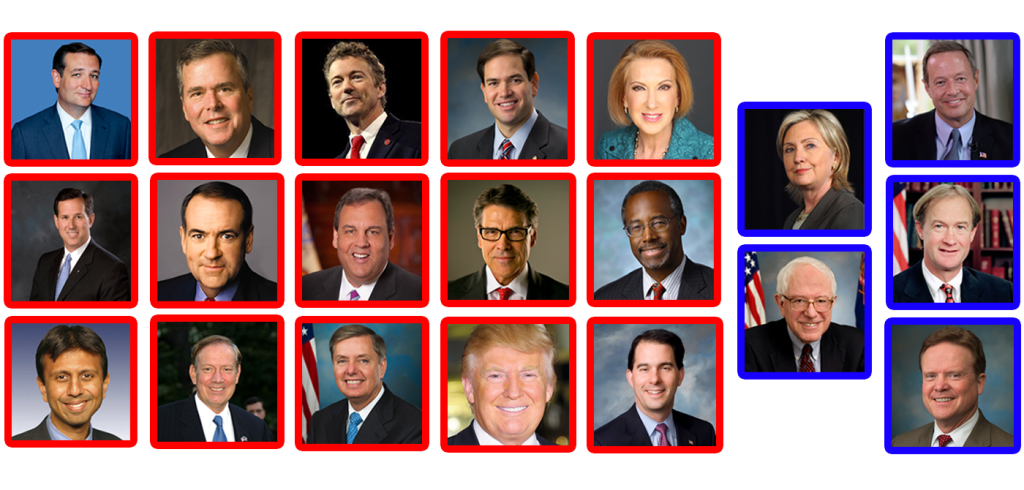
216 days until AL Presidential Primary 470 days until Election Day Convention Dates: Republican July 18-21 2016, Democratic July 25-28 2016 Weekly Headlines: John Kasich becomes 16th Republican to announce presidential bid Donald Trump surging in New Hampshire, Iowa AFL-CIO may delay endorsement of Clinton as 2016 presidential candidate Press Clips Clinton in trouble in Colorado, Iowa, and Virginia (Quinnipiac University Poll 7/22/15) Former Secretary of State Hillary Clinton is behind or on the wrong side of a too-‐close-‐to-‐ call result in match-ups with three leading Republican contenders, U.S. Sen. Marco Rubio of Florida, former Florida Gov. Jeb Bush and Wisconsin Gov. Scott Walker in Colorado, Iowa and Virginia, according to a Quinnipiac University Swing State Poll released today. Perhaps the biggest loser, however, is Donald Trump, who has negative favorability ratings of almost 2-‐1 in each state, the independent Quinnipiac University Poll Ninds. The Swing State Poll focuses on key states in the presidential election. In several matchups in Iowa and Colorado, another Democratic contender, U.S. Sen. Bernie Sanders of Vermont, runs as well as, or better than Clinton against Rubio, Bush and Walker. Vice President Joseph Biden does not do as well. C-‐SPAN scoops Fox News for First GOP candidates encounter (Latin Post 7/20/15) Three days before 10 Republican presidential hopefuls are scheduled to debate on Fox News, many of them will participate in a nationally televised forum hosted by C-‐SPAN. Steve Scully, C-‐SPAN’s politics executive producer, was not shy about touting his network’s scoop, AdWeek noted. “This event is significant” Scully said, “because it will afford the public its first opportunity to hear all of the Republican presidential candidates answer questions on one stage.” So far, the Washington-‐based network has received confirmations from New Jersey Gov. Chris Christie, former neurosurgeon Ben Carson, Ohio Gov. John Kasich, former Hewlett‐Packard Chief Executive Carly Fiorina, South Carolina Sen. Lindsey Graham and former New York Gov. George Pataki. 126 things to know about the 21 candidates running in 2016 (USA Today 7/20/15) With John Kasich’s campaign launch on Tuesday, that’s a whopping 21 candidates who have formally entered the 2016 race. (Still to come? An early August announcement by Republican Jim Gilmore, and a decision by Vice President Biden on the Democratic side.) The parade of contenders into the White House race began in March, when Texas Sen. Ted Cruz announced his bid. Since then, USA TODAY has been compiling facts and tidbits about the large presidential field to help you get to know the men and women seeking the nation’s highest office. Here are the 126 things you should know about 21 presidential candidates: #BlackLivesMatter is winning the 2016 Democratic primary (Time 7/23/15) When Black Lives Matter protestors stormed a room at a meeting in Phoenix and demanded that the 2016 presidential candidates say the names of black people killed by the police, the response was swift: Bernie Sanders did it the next day. “I wish that in the year 2015, I could tell you we have eliminated racism in this country, but you all know that is not true,” said Sanders, to a crowd of more than 11,000 in Houston on Sunday, and then listed the names: “Sandra Bland, Eric Garner, Tamir Rice, Freddie Gray and many, many others.” Donald Trump’s cash will only take him so far in 2016 (Politico 7/23/15) Donald Trump made a bold pledge during his rambling presidential announcement inside the brass-‐laden, marble-‐filled lobby of Trump Tower. “I’m using my own money. I’m not using the lobbyists. I’m not using donors. I don’t care. I’m really rich,” he said. While it’s true that Trump is really rich, the real estate mogul’s Financial disclosure made public this week casts doubt on the idea that he has access to enough cash right now to spend the $1.5 billion or more it’s expected to cost to reach the White House in 2016. Brace yourself, the presidential election is going to be all about anger (NPR 7/26/15) Hillary Clinton laid out some lofty goals for her presidency in a speech on Friday. “My mission from my Nirst day as president to the last will be to raise the incomes of hardworking Americans so they can once again afford a middle-‐class life,” she said. “This is the defining economic challenge not only of this election but our time.” So, she has her work cut out for her. But interestingly, that line came not from a populist barn burner of a speech, but from a policy-‐focused address about ending “quarterly capitalism” — the tendency for businesses to focus on short-‐term shareholder gains over long-‐term investment.
Presidential TV ad roundup: July 17 edition

Here’s a roundup of all the Presidential TV ads from this past week. Jeb Bush: Title: 4 Percent Published: June 13, 2015 Tone: Realistic and hopeful Title: Clinton Twists Published: July 17, 2015 Tone: Informative Mike Huckabee: Title: Reconciliation Published: July 16, 2015 Tone: Encouraging Scott Walker: Title: Recall the recall Published: July 7, 2015 Tone: Powerful and capable Title: Scott Walker for America Published: July 13, 2015 Tone: Authentic Hillary Clinton: Title: Healing Wounds Published: July 10, 2015 Title: Sueños (ad in partial-Spanish) Published: July 15, 2015 Tone: Hopeful Martin O’Malley: Title: Why Maria supports immigration reform (ad in Spanish) Published: July 16, 2015 Tone: Hopeful
Presidential hopeful Martin O’Malley lays out plan for debt-free college
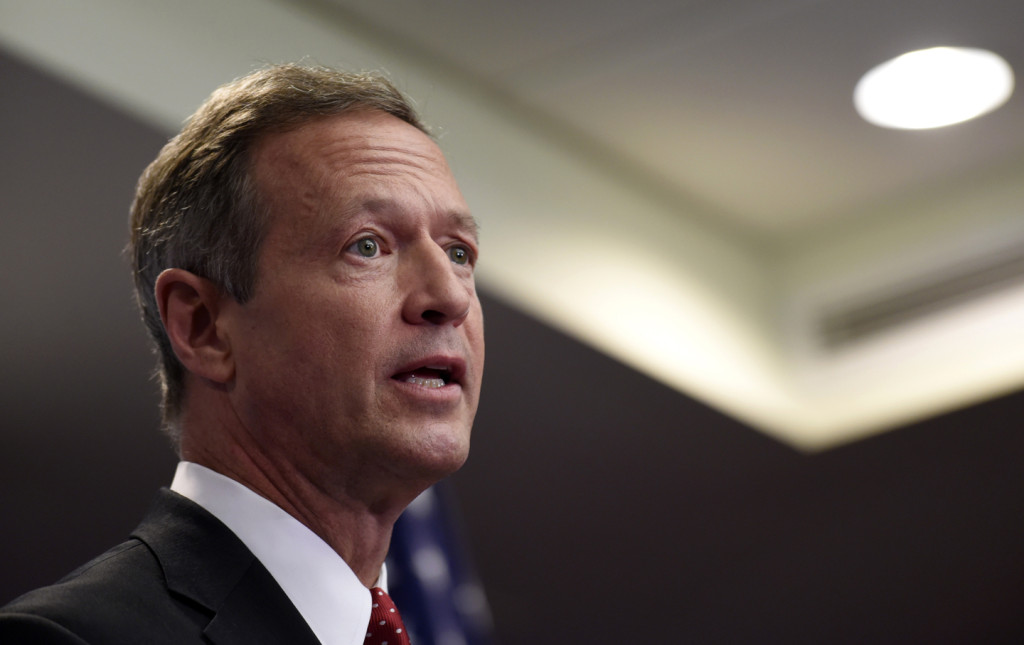
Democratic presidential candidate Martin O’Malley laid out a plan Wednesday to allow public college and university students to graduate without any tuition debt, saying he has the strongest record of any candidate at reducing the cost of higher education. “Making college more affordable for more people is actually really good for the economy,” O’Malley said. “Our economy isn’t money. It’s people.” O’Malley presented his plan at a roundtable event in New Hampshire, telling the group that Maryland’s state universities froze tuition for four straight years during his tenure as governor. The policy presentation comes as O’Malley has struggled to catch fire with Democrats in the early voting state, who so far are preoccupied with rivals Hillary Rodham Clinton and Vermont Sen. Bernie Sanders. But focusing on college costs could help him make inroads with younger voters in New Hampshire, where the average student loan debt burden is the highest in the nation. Sanders has called for making college tuition free, introducing legislation in the Senate to tax financial transactions to pay for it. Clinton has emphasized the need to lower college costs, but has yet to be specific on how she would do so. O’Malley said he agrees with Sanders’ idea of taxing financial transactions, but said having the federal government pay for tuition won’t reduce college costs. “If you simply cut a check for tuition, you’re going to see tuitions go up and up and up and eventually we all foot that bill,” he said. O’Malley’s plan instead focuses on reducing tuition at state schools, providing incentives in the form of matching grants for states to invest more heavily in their public colleges and universities, and making it easier for students to transfer credits and take courses online to complete their degrees in a timely manner. His more ambitious goals would require heavy buy-in from the states. His plan, for example, calls on four-year public schools to lower tuition to 10 percent of states’ median income while also enticing states to increase their share of funding for their public universities. State aid for higher education has been cut in many states in recent years as states struggle with tight budgets. “By setting a national goal, you make state actions much more open and transparent so that citizens know and citizens can apply the pressure,” O’Malley said. O’Malley’s plan includes familiar policy ideas, such as allowing students to refinance their loans and automatically enrolling people in income-based repayment plans. He is also proposing an increase in Pell Grants and a tripling of the number of work-study jobs to help students cover college costs beyond tuition, such as room and board. One participant in the roundtable told O’Malley she is the first person in her family to go to college and is now saddled with $100,000 in debt that her parents can’t help her repay. A local lawyer said it took him more than four years to complete school because he had difficulty transferring credits between schools. Now, he is too burdened with his own debt to help his daughter pay for college. “Multiply these stories by thousands and thousands and thousands,” O’Malley said. “Then it’s not quite a mystery why our economy’s not growing at the pace that it used to.” Republished with permission of The Associated Press.
Former Virginia Sen. Jim Webb opens presidential bid
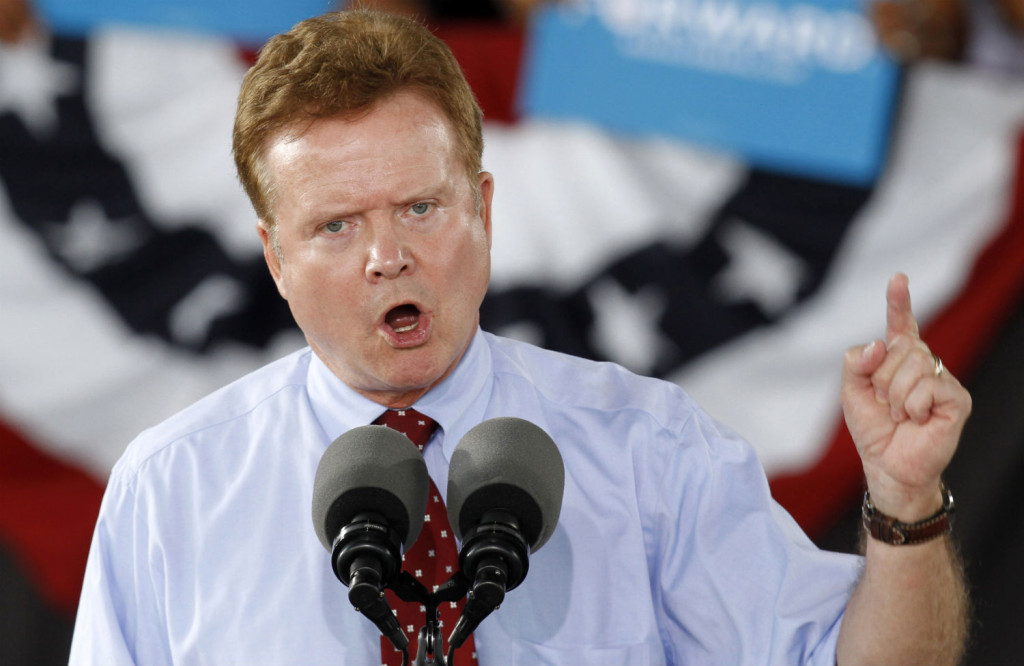
Former Virginia Sen. Jim Webb announced his presidential campaign on Thursday, opening a long-shot bid against Hillary Rodham Clinton and a field of Democratic rivals for the party’s nomination. Webb, in an announcement posted on his campaign website, acknowledged he would face major hurdles but vowed to bring an outsider’s voice to the 2016 race. “I understand the odds, particularly in today’s political climate, where fair debate is so often drowned out by huge sums of money. I know that more than one candidate in this process intends to raise at least a billion dollars,” Webb wrote. But he said the nation “needs a fresh approach to solving the problems that confront us and too often unnecessarily divide us. We need to shake the hold of these shadow elites on our political process.” Webb, 69, a decorated Vietnam veteran and former Navy secretary under President Ronald Reagan, surprised many Democrats when he became the first major figure in the party to form a presidential exploratory committee last November. He has outlined the roots of a campaign message that include helping working-class Americans compete in the economy, tackling campaign finance reform and preventing the U.S. from getting involved in foreign entanglements like Iraq and Afghanistan. Webb’s opposition to the Iraq War — his son Jimmy served in the war — played a central role in his surprise Senate election in 2006 against Republican Sen. George Allen. While he chose not to seek re-election after one term, his military and foreign policy credentials could allow him to become a debate stage foil to Clinton, who was President Barack Obama‘s secretary of state. Webb has said U.S. foreign policy has been “adrift” since the end of the Cold War and called for a new foreign policy doctrine that would outline the circumstances in which the U.S. would use military force. Webb has made frequent trips to the early voting states of Iowa and New Hampshire, but early polls show him trailing in a field dominated by Clinton that also includes Vermont Sen. Bernie Sanders, former Maryland Gov. Martin O’Malley and former Rhode Island Gov. Lincoln Chafee. Republished with permission of The Associated Press.


